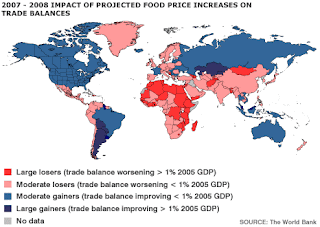According to Bloomberg’s information services on business and finances, the world prices of cereals over the last 12 months (one year to March 08) have increased in percentages hard to imagine:
- Wheat 130%
- Soya 87%
- Rice 74%
- Corn 31%
What remains unchanged is the overall picture of losers and winners. Just check up the map below. No surprises. Same winners, same losers:
To add insult to injury, a nasty effect of this world wide scenario is being felt in lovely beer-ville. The end prices of suds are going up as well. According to Nora Lacey, of Canada’s ANBL, “a lot of brewery costs have gone up: fuel cost has risen, hops price has gone up, and even the price of glass has changed significantly for some breweries. Those items will affect the price” (http://www.telegraphjournal.canadaeast.com/).
It seems that it is about time for us to send some of our key policy makers to the Czech Republic. It is out there where this token of wisdom is found:
“The government will fall that raises the price of beer.”
They’d better follow such warning because at the end, some of us endorse to the Egyptian admonition that goes:
“Do note cease to drink beer, to intoxicate thyself, to make love, and to celebrate the good days.”
Moreover,





